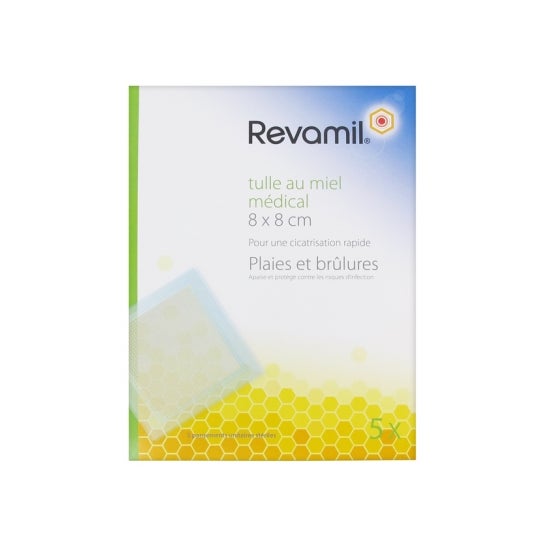Sterile sanitary pads for sanitary use, impregnated with medicinal bee honey. Made with a thin polycellulose acetate mesh, with a non adherent and non-traumatic texture. It favours the wound healing process and protects them by preventing over-infection. Its composition helps to maintain moisture and ph beneficial for the healing process. Each box includes 5 pieces of 8x8cm. Indicated in case of surgical wounds, 1st and 2nd degree burns or trauma.
Prevamil Tela Médica Honey 8x8cm 5pcs
Log into your account and set up an alert to be notified when the product becomes available again.
Do you want us to notify you when it is available?
Promotes the wound healing process and protects wounds by preventing superinfection
Description
Instructions for use
Place on the previously sanitized wound and replace every two days.
Unit price
Pharmaceutical Advice
Burns are damage and destruction to the integrity of the skin caused by heat, chemicals, electricity, sun exposure or other radiation energy. At the domestic level, the most common burns are caused by liquids, hot steam or contact with a surface at a high temperature. These burns can reach more or less deep layers and affect adjacent structures (hair follicles, sweat glands). Their extent can be variable. They are classified into different degrees depending on these factors (degree 1 being the most superficial and least serious).
In cases of mild, superficial and not very extensive, slightly red burns (for example, after exposure to the sun), intensely moisturise the skin with soothing and moisturising emulsions. Sunscreen will also be necessary to protect the area with a high SPF and appropriate clothing and accessories. Remember that sunburns are indicative of deep damage to the skin, with alterations to cellular DNA, so it is always best to avoid them by using sunscreen and being responsible with sun exposure.
Other types of minor burns can be relieved immediately by placing the area under cold water for a few minutes. Then, when the skin is dry, apply a soothing, antiseptic and regenerating ointment. The damaged area should be covered with sterile bandages or dressings with silver particles (with an antibacterial effect). It should also be protected from the sun to avoid post-inflammatory hyperpigmentation. If any more serious signs appear, such as malaise, fever, discharge from the affected area, blisters, pain or other signs of infection, consult a healthcare professional.
Safety and product information
Safety visual aids
At this time we do not have safety images for this product, but we are working on it. We encourage you to check back later for updates. In the meantime, we recommend that you read the safety information that comes with the product before using it. If you have any questions about safety, please do not hesitate to contact us. Also, if you wish, you can also return the product by following our terms and conditions.
Manufacturer details
At the moment we do not have the manufacturer's details, but we are working to add them as soon as possible. We invite you to check back later for updates. If you have any questions, please do not hesitate to contact us, we will be happy to help you.
Opinions
There are no reviews for this product yet. Be the first to share yours!
RELATED SEARCHES ABOUT Bandages
New in Flesh wounds
- Nexcare N1530-1D Papel Adhesivo 25mmx5m 1ud
- Leukoplast Leukomed Skin Sensitive 8x10cm 5uds
- Alvita Agua Purificada 1L
- Euroreel Adhesivo Algodón 5mx1.25cm
- Hansaplast Second Skin Protection XL 3 apósitos
- Hansaplast Second Skin Protection Regular 6 apósitos
- Holbasic Alcohol Etilico Sanitario 70° 250ml
- Bastos Viegas Vendaje Gaza 10x10 10uds
- Master Aid Duolastic Vendaje Elastico7mx10cm
- Bastos Viegas Compresa 427/021 10x10 100uds


